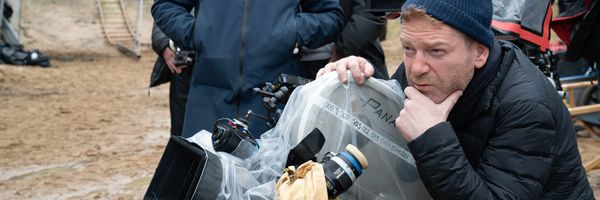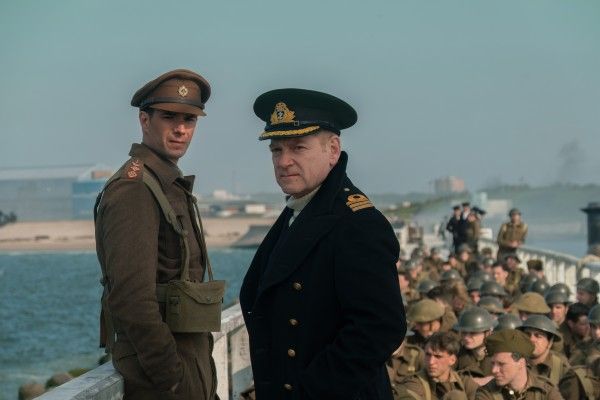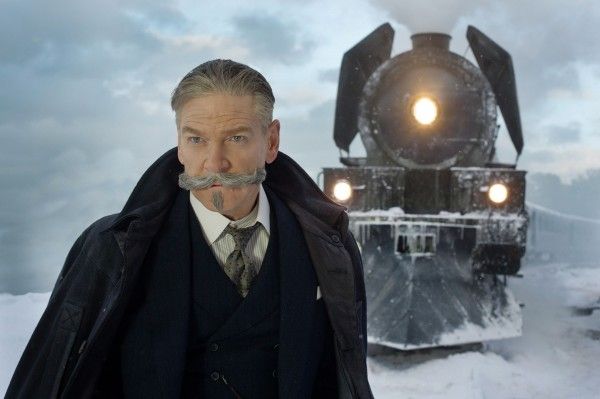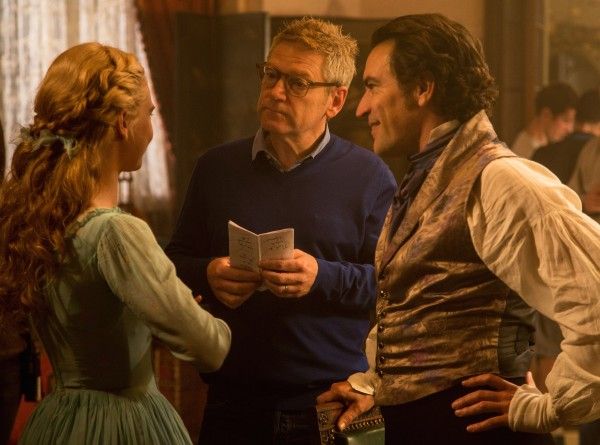Earlier this year, I got to travel to London with a group of other journalists to see filming on Kenneth Branagh’s adaptation of Artemis Fowl. For those who are unfamiliar with the hit YA novel, it follows the title character (played by newcomer Ferdia Shaw), a criminal mastermind who is drawn into a world of fairies an running afoul of fairy authorities. However, there have been some changes from the book as you’ll see from the official synopsis:
Disney’s “Artemis Fowl,” based on the beloved book by Eoin Colfer, is a fantastical, spellbinding adventure that follows the journey of 12-year-old genius Artemis Fowl, a descendant of a long line of criminal masterminds, as he seeks to find his father who has mysteriously disappeared. With the help of his loyal protector Butler, Artemis sets out to find him, and in doing so uncovers an ancient, underground civilization—the amazingly advanced world of fairies. Deducing that his father’s disappearance is somehow connected to the secretive, reclusive fairy world, cunning Artemis concocts a dangerous plan—so dangerous that he ultimately finds himself in a perilous war of wits with the all-powerful fairies.
While the details of my full set visit are still under embargo, I’m pleased that I can share our interview with director Kenneth Branagh.
During our conversation, we talked about what attracted to him to the books, how Artemis’ journey is similar to The Godfather’s Michael Corleone, casting the young actors, reteaming with Nonso Anozie, Josh Gad, and Judi Dench, filming in Ireland, and much more.
Check out the interview below, and click here for the teaser trailer. Artemis Fowl opens August 9, 2019.
What attracted you to the books?
KENNETH BRANAGH: The imagination. It felt very original. I loved its Irishness. Frankly, I love that part of that country. The collision sometimes with the proximity of worlds, very few worlds. I like that creatively. It always feels like it's a good, risky place to be. I've had some experience with it making the film Thor, where a very contemporary feeling, still heightened world of science is right next door to a world of magic. So, it was very fascinating to me. It means you can be very poetic. It means you can have a size that does invite an audience to go to the movies to go to a big screen with a lot of other people, because somehow the subject matter expands away from the norms. The combinations of tones, and they're not just the worlds, and the looks, and the textures, or the different kind of visual techniques you might use. Just, tonally, very funny, often very, very funny. I've always found myself drawn to a sort of balance between that and emotional content, which we've chosen to really try and emphasize in the books.
There's such a lot to learn, frankly. It's been really fantastic thing to do. The same with Thor. Anything I do is an invitation to delve into things you don't know, read, and expose yourself to experience, and stuff that is new. So, that's been fantastically rewarding.
So, a majority of your main cast is very young. Two of those characters are actually aged down, Holly and Juliet. Was that difficult working with young actors who have the burden of this franchise, but also the decision going into aging them down?
BRANAGH: There's a great theater director named Peter Brook who talks always about the uniformed hunch. The uninformed hunch was that there's a kind of youthful quality across these stories that I've thought would just be really emphasized, and perhaps enjoyable in a way that maybe people of the same age might relate to if there was that sort of collegiate and quality of camaraderie. Where, maybe the idea of older sister, or sort of teaching figure, Holly, to Artemis was differently sort of calibrated. Holly is by no means, it seems character wise in the books, a Tinkerbell. She's not a small, and fleet, and miniature. She's a very spirited woman, although she's a fairy, but of course Eoin Colfer plays beautifully with human characteristics and his own made-up fairy characteristics.
But, an idea that we might see, with only really going into the idea of making more film, because the public will tell us if they wanna see anything else. That if, it works, they can sort of grow up together. I liked the idea of that. So, for me, the blur that he explores is one I wanted to, where the fairyness, or their humanity keeps being sort of muddled. Many times the sort of emotional quality I've touched-on is had when you forget for a second that Holly Short is a fairy, or Commander Root is a fairy. You not aware of their ears part of the time. When you're caught-up in the sometimes family dynamics, or social dynamics, sometimes it allows you to play quite dramatic scenes, or quite emotional scenes as if it were from any other kind of drama. You open a door, and you're into some of other kind of quite crazy world where you suddenly realize, wow she can fly! She's got big ears, she's got magic, etc. Closer in age just made it feel as though Artemis was less isolated, and we could have some fun with that particular age group.
How villainous would you say is Artemis in this movie, and how sympathetic is he?
BRANAGH: I think it was always a big, big challenge to see whether the starting pointing of the book, the first book, is that he is a bit more disposed to be villainous. Where the idea, and we know how fast the world moves these days, in terms of what seemed normal at one point, seeming very abnormal. The idea of master criminality being a sort of cool thing, is something to have a look at again, without trying to be revisionist. We try to find the center in the spirit of the book.
I guess with the first movie, to try and answer your question, we I think offer up a journey from a relative normality. We put Artemis more in a normal school, a regular school. We see him with other people. We tried to suggest that this beautiful, crazy, bonkers house is one full of imagination from fowls who added to it over century, over century. But, at an imagination and invention less about the acquisition of goods and land, and things, and more about looking out into the world of magic, and the cosmos, and astronomy. That this kid, when we see him in here, hopefully maybe invites our movie audience to wanna come in here and be here with him, and be in a place that's crazy and warm, but not exclusive.
To that extent he maybe if not sympathetic, recognizable, a little more one of us. This first movie, if it is a first movie, and definitely if it isn't, becomes a bit of a case of an origin story. In the case of the latter, hopefully, would be a satisfying account of how a guy who does not know about magic, or in this case the workings of his father, the secret business practices of his father, and has to go through a story that puts him the idea well does he think being villainous is good? Or, being a criminal is good? Does he start liking fairy gold? Does he like the power that's acquired when you steal a neutrino handgun from Holly Short? Or, you outface Commander Root? Or, do all of these sort of grown-up things that the story is forcing him to embrace?
To be honest, a story that, please don't take this to literally. A story's shape that I found interesting as we considered this, I always look at the masters, the great classics is the Godfather. Where Michael Corelone, as you may recall at the beginning of the first film, although part of a family he knows to be involved in business, he's been in the services, he's not entirely aware of what exactly dad does. I think Artemis has by the end of the picture, has to face up to well shall I do some of this as well? Do I believe in it? Am I behind it? We're in a world that offers a different kind of fun, we hope, and enjoyment adventure, and pace as well.
I think one of the things that engages people I hope, certainly did me with the books, and I hope us with the film, is that it'll be very rapid. It's a movie that in my view anyway, touch wood will be way under two hours—ninety minutes in my mind. When I'm making films, I always try and watch classic movies of the past, of any kind, of any genre, at ninety minutes. I think that's a terribly challenging time-period to do lots of things well. And yet, as I got to the movies all the time and I sit for the extra twenty minutes that I don't think we usually need. I've provided those twenty minutes on numerous occasions.
Speaking as a guilty party, I tend to think, it's not like people's attentions spans are necessarily shorter, but it's a miraculous and beautiful thing when that which you might want out of a escapist entertainment. Which is to be moved and diverted, entertained, and have excitement, and drama, can all happen in a breathlessly kind of compact space. That's what I'm aiming for. I think Eoin Colfer offers that invitation, because I think he does it in the books.
Was Josh Gad in the back of your mind as you were making Murder on the Orient Express for this role?
BRANAGH: We try and always start with a clean slate. What I knew was, that he was a joy to work with, as indeed is Judy Dench. Josh it was a first time experience, I had met him before, but a first time experience working with him. But, certainly I knew that, because I felt he was Irish in spirit. That a certain kind of fringe of anarchy would be in the movie. Everybody's taking part in that. Whether it's today, where Mulch Diggums at a moment of enormous stress, and tension, and drama decides that he can subdue a troll in unusual ways, and he has fun with that. We work, we get along very well with Disney Family. So, we share all this kind of stuff.
There was always a kind of understanding that we're gonna improvise quite a bit. Not just Josh Gad, but also Nonso Anozie, who's a wonderful actor. I've had the chance to work with him a number of times. Even Judy Dench, who when faced with these prospects the other day, I said, that's great we've got exactly what's scripted, now when you say this, this and this, and if you think of something else would you do that? To which, she replied, I'm not Josh Gad. Terribly, terribly clever. I said to her, do you want to do it? Yes, I do want to do it, yes. I'm learning from him, she said.
It's partly because it's Irish, and it's fairies, and the sort of speed and pace of this first sort of siege movie feels as though it's incredibly volatile, and you don't quite know what's gonna happen.
What went into casting Artemis and his sister? They don't exactly look like they're related, like from first glance.
Kenneth Branagh: There's no sister for Artemis. Juliet. Juliet. Juliet, who in the book is sister to Butler is in this case is niece to Butler. We asked Owen up front, we'd like to be free to bring as much imagination to the casting as possible. So, for instance he describes in the book Butler as Eurasian. In the context of the world that he created felt that as though that could lead to a number of possibilities. But, certainly the biggest thing he needed to get was the sense that he was an effective bodyguard. Whether he was very large, or very small, or whatever particular country he came from. I always wanted to have Nonso in the part, he really was somebody I thought about from early on. I worked with Nonso probably fifteen years ago. That started that. With Artemis, and with Holly, and with Juliet we looked at literally hundreds, in fact thousands of people to find what we thought was the right characteristics. We didn't quite worry about the absolutism of backgrounds. She's mixed race. We think that's fine.
My attitude to all this goes back to from the beginning of going to work, and in something like Much to Ado About Nothing, which is over twenty years ago casting Denzel Washington and Keanu Reeves as half-brothers. It's a world in which, it's part of the spirit of the movies. This is the world we're in. Judy Dench is not the male officer that appears to be in the book. At the same time you can say, well the characters a fairy. You know male fairy, female fairy. We asked Owen if we could have that kind of license, and he said let's do it. Then, we followed our instincts about what we thought were talented people who were right for the part. Try to be very, as is always part of my taste, is for a sort of eclecticism and pluralism in that way.
Did you want an unknown for Artemis from the start? Is that important?
BRANAGH: It felt probably, that was given the age range, it was likely to be the case. Although, there's some fantastic actors of that kind of age. What I guess we did feel was, they did feel it would probably be doing something for the movie if that actor really was Irish. We auditioned probably 1,200 boys, anybody in Ireland who applied. People from all over the world. Absolutely from all over the world. A tough one was people from other cultures or backgrounds doing an Irish accent. It's tough, for the best in terms there's so many of them. They are in every nation, there's always a trillion accents, so there isn't a single one. There is a sort of a little free cultural free song that you get out of a kid. In his case he comes from Kilkenny.
Lara McDonnell, who plays Holly Short, who's part of a fairy world that appears to be underneath Ireland. She also happens to be Irish. That helped, I think, locate something quite distinct in the tone of the movie. We hear the accents so much, that it feels as though we just really are in another place.
But, ultimately it was the known, unknown was less of an issue, than does it, that elusive thing that in making anything creative, does it seem or feel right? Whatever right is.
I understand you're gonna be filming for a few weeks in Ireland as well. What aspects did you feel you had to really be able to represent?
BRANAGH: When I scouted there, the thing I thought that could only be Irish was the weather. It was, across the few days I was there this last time, it was like half a dozen different kinds. But, pleasing to see.
Frankly, there's a certain Irish aspect of the weather that we benefited from. There's a beat in the movie set what appears to be a frozen Siberia, which we were about to build an enormous set for. Then, the snow came instead, and we went outside. We certainly had the benefit of that.
It's often, even for a short-time, I think the spirit of place. Even for a few days if you're in a different place and you go to a shop, or walk in a park, or just hear voices or whatever. There's a different sense and vibration from its very sort of authenticity. We went to Ho Chi Minh City to shoot, at the beginning of our shoot. I don't know if any of you've been there. I'd only been for the scout. Ferdia and Nonzo who came with us had never seen it before, and they were both on mopeds traveling around the city. Safely. It was an incredible sort of culture shock. The noise, the intensity and density of the traffic, particularly, moped and motorcycle traffic. Friendliness of the people, intensity of the people, curiosity of the people, and all of that is an incredible sort of injection into the beginning of the movie, as I believe is Ireland and the sea, the Atlantic coast.
I was thinking when I fly home, there isn't a green that is like, there's no other color but that Irish green. Sounds like a bit of a sentimental thing to say, but that's always how I feel about it. That's in the movie, I think it's a good thing.
I was just wondering with the addition of Judy Dench, it kind of takes out the part of Holly's story where she's the first female officer. So, I'm wondering how you dealt with that?
BRANAGH: You can imagine with Judy Dench, we have a powerful female mentor discussing other ways in which Holly's advancement, and her particular position in the LEP Recon can be distinct, and powerful, effective. It has a different kind of spin, so I'd say we retain a very strong interest in Holly's independence, and also the isolation that the story puts her under pressure, puts under with legend about her so-called notorious, possible father. We didn't make life any simpler for her in terms of progress. There are plenty of obstacles, it's systemic, and sometimes male, that get in her way. That occurs, to some extent, for the character of Commander Root as well.
We try and inject with likeness, and found a bit of real politic into that. The world will get reflected, I think you'll find in the way she goes through the story.




